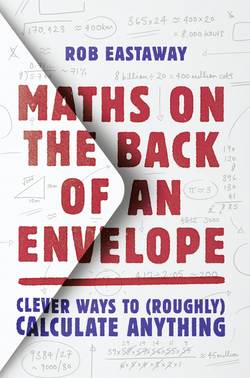Читать книгу Maths on the Back of an Envelope: Clever ways to (roughly) calculate anything - Rob Eastaway - Страница 9
PRECISION VERSUS ACCURACY
ОглавлениеThe words precision and accuracy are often used interchangeably, to indicate how ‘right’ a measurement or number is. It is certainly possible for a number to be accurate and precise; for example: 74 × 23.2 = 1,716.8.
But used mathematically, precision and accuracy mean different things.
‘Accuracy’ is an indication of how close you are to the right answer. Suppose we are playing darts. I throw a dart at a dartboard and just miss the bullseye. My throw was quite accurate, but if you then throw and hit the bullseye, your throw was more accurate than mine. Likewise … if I tot up the items in my shopping basket and estimate that the total will be £65 while you reckon it will be £70, and the bill turns out to be £69.43, then you were more accurate than I was.
Precision, on the other hand, is an indication of how confident you are in a number to a particular level of detail, so that you or somebody else would come up with the same figure if you did a measurement or calculation again. If you think the shopping basket will add up to £69, you are confident that you are right to the nearest pound; but if you suggest the bill will be £69.40, you are being more precise, and are confident your figure is right to the nearest 10 pence. Even more precise is £69.41. In maths terms, precision is about how many significant figures (this is an important concept – please see here) you can quote a number to.
As a society, we put a lot of faith in precision. If we see a number such as 84.36, we tend to believe that the person who produced the number is confident of that figure to the second decimal place. We might even honour them with the label of ‘expert’ because they were able to produce a number to such precision. But people who produce ‘precise’ figures often abuse our trust, and accidentally or deliberately they imply a level of confidence that is not justified. When we read that 59,723 people attended an Arsenal football match, we are being led to believe that an exact tally was taken as fans went through the turnstiles. So when we discover that the actual number in the ground was closer to 50,000, we feel like we have been conned. 3
When it comes to the use of numbers to interpret the world, accuracy is more important than precision. After all, a measurement that is accurate but not precise can still be helpful. But a measurement that is precise but inaccurate is not just unhelpful, it can sometimes be dangerous.
One of the unintended consequences of calculators is that they will give answers to as many decimal places as will fit on the screen – and in doing so, they tempt us to work to a level of precision that is often not justified.
